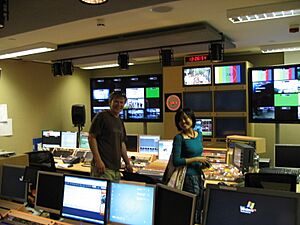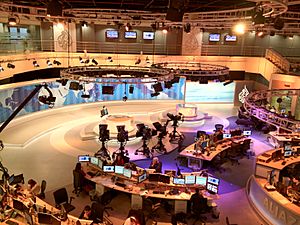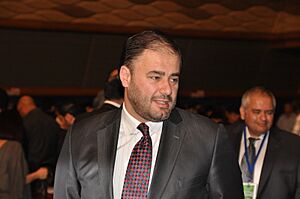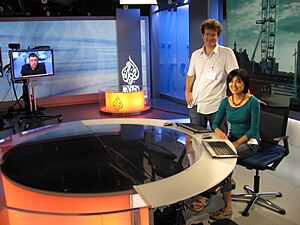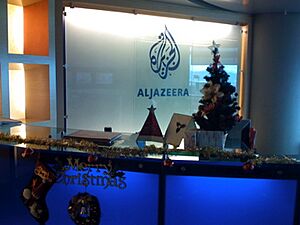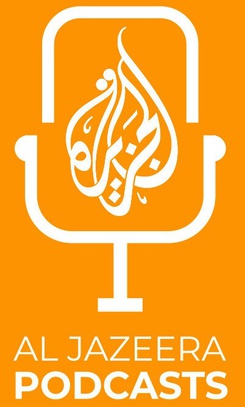Al Jazeera Media Network facts for kids
 |
|
|
Native name
|
شبكة الجزيرة الإعلامية
|
|---|---|
| Private foundation for public benefit | |
| Industry | Mass media |
| Founded | 1 November 1996 |
| Founder | Hamad bin Khalifa Al Thani |
| Headquarters | Qatar Radio and Television Corporation Complex,
Wadi Al Sail, Doha
,
Qatar
|
|
Area served
|
Worldwide |
|
Key people
|
|
| Products | News broadcasting, web portal |
|
Number of employees
|
3,000 |
| Subsidiaries |
|
Al Jazeera Media Network (often called Al Jazeera) is a large news company based in Doha, Qatar. It gets some funding from the government of Qatar. Its most famous channels are Al Jazeera Arabic and Al Jazeera English. These channels share news from around the world, show documentaries, and host talk shows.
Al Jazeera started as a satellite TV channel for Arabic news. Now, it's a huge network with many online platforms and TV channels in different languages. It has 70 news offices around the world. This makes it one of the biggest news networks globally.
The Qatari government helps fund Al Jazeera. Some people think Al Jazeera Arabic's news is influenced by Qatar's government. However, Al Jazeera English is generally seen as independent. Al Jazeera has sometimes been criticized by governments that don't like its reporting. For example, during a disagreement with Qatar, some countries demanded Al Jazeera be shut down. Other news groups spoke out against this idea.
Contents
History of Al Jazeera
How Al Jazeera Started
The original Al Jazeera Satellite Channel began on November 1, 1996. This happened after a BBC Arabic TV channel closed down. That BBC channel had problems with the Saudi government over a documentary.
The leader of Qatar, Sheikh Hamad bin Khalifa, gave Al Jazeera a loan of about $137 million. This money helped the channel operate for its first five years.
On its first day, Al Jazeera broadcast for 6 hours a day. By the end of 1997, it was broadcasting for 12 hours. On January 1, 1999, Al Jazeera started broadcasting 24 hours a day. Its staff grew to 500 employees, and it had offices in many places, including Europe and Russia.
Al Jazeera and the Arab Spring
Al Jazeera played a big role in sharing news about the Arab Spring in 2011. The Arab Spring was a series of protests and uprisings in many Arab countries. Al Jazeera was the main news source that spread information about the unrest in Tunisia across the Middle East.
People in the Middle East often relied on Al Jazeera for news about their region and the world. Hillary Clinton, who was the U.S. Secretary of State at the time, said that Al Jazeera was "literally changing people’s minds and attitudes."
Al Jazeera broadcast news about the unrest in Arabic for the Arab world and in English for audiences everywhere else. In Tunisia, the government tried to stop Al Jazeera from reporting. But with the help of Facebook users, Al Jazeera still got reports from protests. Its intense coverage encouraged more people to join the revolution.
People in other Arab countries like Bahrain, Egypt, Yemen, Libya, and Syria also started protests. This was influenced by Tunisia's successful revolt, which Al Jazeera covered widely. Al Jazeera English also reported on human rights issues, which helped gain international support for the movements.
Changes and Growth
Al Jazeera changed its structure to bring all its different channels under one network. Wadah Khanfar, who was the head of the Arabic Channel, became the Director-General of the entire Al Jazeera Network. He later resigned in 2011.
In 2009, Al Jazeera English was allowed to broadcast by satellite in Canada. In 2011, Al Jazeera Media Network changed its legal status. It became a "private institution of public utility." This means it's a private company that works for the public good. The network also gets money from its TV contracts and its sports channels.
Al Jazeera Channels
Al Jazeera Arabic
Al Jazeera Arabic started on November 1, 1996. It was created after another Arabic news channel closed due to disagreements over censorship. Many journalists from that channel joined Al Jazeera. They brought a new style of investigative journalism to the Arab world.
Al Jazeera Arabic became very popular because it offered a different view from state-owned news channels. It was open about criticizing leaders and showed many different opinions. It gained trust for its detailed reporting from places like the Second Intifada and the Iraq War. Al Jazeera Arabic makes its own editorial decisions, separate from Al Jazeera English.
Al Jazeera English
Al Jazeera English (AJE) launched on November 15, 2006. It is the English version of Al Jazeera Arabic. It aims to be an alternative to Western news channels like CNN and BBC. It focuses on letting people tell their own stories. Al Jazeera English is known for its deep reporting, especially in conflict areas like the Arab Spring and the Gaza–Israel conflict. Its Arab Spring coverage won many awards.
After the events of 9/11, there was a big demand for an English version of Al Jazeera. In 2003, Al Jazeera hired its first English-speaking journalists. It also launched an English website called "Al Jazeera Net." This website aimed to connect with Western audiences. However, the website faced many cyberattacks and had to shut down later in 2003.
On July 4, 2005, Al Jazeera announced plans for a new English satellite service. It launched on November 15, 2006, as Al Jazeera English. It had broadcast centers in Doha, London, Kuala Lumpur, and Washington D.C. Many experienced journalists joined its team.
Al Jazeera Balkans
In 2011, Al Jazeera Media Network created Al Jazeera Balkans. This channel broadcasts in Bosnian, Croatian, and Serbian languages. It is based in Sarajevo, Bosnia and Herzegovina, and serves the Balkan region.
Al Jazeera Turk
In 2011, Al Jazeera bought a Turkish TV channel and planned to launch a Turkish language Al Jazeera operation. In 2013, they announced Al Jazeera Türk, based in Istanbul. On January 22, 2014, Al Jazeera Türk's website launched with news content. This made it the first 24-hour news operation to go digital before broadcasting on TV. The TV channel was planned for late 2014, but the website shut down in 2017, and the channel never launched.
Al Jazeera America
Al Jazeera America was an American version of Al Jazeera English. It launched on August 20, 2013, in the United States. Al Jazeera Media Network bought Current TV to create this channel.
Al Jazeera America aimed to produce most of its content in the U.S. The channel faced challenges getting carried by some cable providers. On January 13, 2016, Al Jazeera America announced it would close on April 12, 2016, due to economic reasons. Al Jazeera English became available digitally in the U.S. in September 2016.
AJ+
Al Jazeera Media Network also has a digital-only news channel called AJ+. This channel is mainly found on social media and YouTube. It is operated by Al Jazeera New Media from Washington, D.C. AJ+ focuses on on-demand content. It started on June 13, 2014, with a webpage and videos. The full channel launched with an app on September 15, 2014. There are also Arabic and Spanish versions of AJ+.
Al Jazeera Sport (now beIN Sports)
In 2004, Al Jazeera started its sports division, Al Jazeera Sport. It created 8 Arabic language sports channels. On January 1, 2014, Al Jazeera Sport was renamed beIN Sports. All of Al Jazeera's non-news and current affairs channels were spun off into a new company called beIN Media Group.
JeemTV and Baraem
On September 9, 2005, Al Jazeera launched a children's channel called Al Jazeera Children's Channel (now JeemTV). It targets kids aged 7 to 15 and broadcasts 24 hours a day.
On January 16, 2009, Baraem launched. This channel is for younger children, aged three to seven. On April 1, 2016, both JeemTV and Baraem were acquired by beIN Media Group. They became part of the beIN Channels Network and are no longer free to watch.
Online Presence
Al Jazeera operates several websites. Aljazeera.com is the main website for Al Jazeera English and Al Jazeera Balkans. For its Arabic content, it has Aljazeera.net, and for Turkish content, Aljazeera.tr.
On January 1, 2018, Al Jazeera launched a Mandarin Chinese news website. This made it the first Middle Eastern news provider to target Chinese audiences. The staff uses Chinese social media like Weibo and WeChat to connect with viewers.
Al Jazeera Podcasts
In 2017, Al Jazeera launched a podcast network called Jetty, later renamed Al Jazeera Podcasts. It is available on their website and other podcast platforms. The network is based in San Francisco and offers English-language podcasts. Some podcasts explore topics like global economics through soccer, freedom, and global music.
Rightly
In 2021, Al Jazeera launched Rightly, an online news channel for American conservatives. Like AJ+, it is only available online, mainly on YouTube. This channel raised questions among Al Jazeera staff and media critics about whether it fit Al Jazeera's goal of being non-partisan.
Al Jazeera Center for Studies
Al Jazeera Media Network also runs the Al Jazeera Center for Studies. This center, started in 2006, studies current events around the world. It focuses on politics and developments in the Arab world. The center aims to encourage discussion and understanding between different cultures. It also includes the Al Jazeera Media Training and Development Center.
Al Jazeera Documentary Film Festivals
The Al Jazeera International Documentary Film Festival is an annual film festival held in Doha, Qatar. It started on April 18, 2005. Each year, the festival has a different theme.
The Al Jazeera Balkans Documentary Film Festival began in 2018. It is an annual international documentary film festival based in Sarajevo, Bosnia and Herzegovina.
Other Channels
Al Jazeera Media Network also operates:
- Al Jazeera Documentary Channel: An Arabic language channel showing documentaries.
- Al Jazeera Mubasher: A live politics and public interest channel. It broadcasts conferences in real time without editing or commentary. It was the first channel of its kind in the Middle East.
Partnerships
Al Jazeera has formed partnerships with other major companies:
- In 2017, it partnered with Google.
- In 2019, it partnered with the China Intercontinental Communication Center to expand its documentary content.
- The same year, Al Jazeera and Bloomberg signed a content agreement.
- In 2021, Al Jazeera partnered with Arewa 24 to provide content in the Hausa language.
- In 2023, Al Jazeera partnered with Avid Technology.
The Al Jazeera Effect
The "Al Jazeera effect" describes how Al Jazeera Media Network has influenced global politics. It means that governments and traditional news outlets have less control over information. This gives a voice to groups that didn't have one before.
Al Jazeera aimed to challenge government censorship and the Western view of Arabs. The term "Al Jazeera effect" was first used to describe how Arab governments lost control of information because of Al Jazeera's popularity. It now also refers to how other new media, powered by the internet, have a similar impact.
Al Jazeera encourages discussion and offers many viewpoints. It acts as the "voice of the voiceless." It changed the flow of information, reporting on countries that were often ignored. It also gave a platform for Arab citizens to express themselves. Many agree it played a role in reforms during the 2005 Arab Spring. Experts believe new media, like Al Jazeera, help promote democracy and political change worldwide.
Editorial Independence
Al Jazeera Media Network gets public funding from the Qatari government. It is set up as a "private foundation for public benefit" under Qatari law. Some experts and news outlets believe the Qatari government has some influence over Al Jazeera's content, especially its Arabic news. However, Al Jazeera says its reporting is not controlled by the Qatari government and does not show any government viewpoint. While Al Jazeera is not fully controlled by the government, it is still owned by it.
Critics have said that Al Jazeera's Arabic coverage is influenced by Qatar's foreign policy. They claim it sometimes presents events in a way that favors Qatar's goals, such as its coverage of the Iraq War and the Arab Spring. Some have also said that criticism of Qatar's ruling family is censored in its Arabic news. Other experts argue that Qatar does not have strong control over Al Jazeera's Arabic coverage and that it often operates independently. Most sources agree that Al Jazeera's English news is more objective and independent than its Arabic news. Al Jazeera English has its own rules for reporting and is separate from Al Jazeera Arabic.
Bans and Restrictions
Al Jazeera has faced bans and restrictions in several countries:
- Algeria: In 1999, some Algerian cities lost power, reportedly to stop people from watching an Al Jazeera program. In 2004, the Algerian government stopped Al Jazeera's correspondent from working there. This was likely because of a debate broadcast about Algeria's political situation.
- Bahrain: In 2002, Bahrain banned Al Jazeera correspondents, saying the station was biased. They returned in 2004 after relations improved. But in 2010, Bahrain banned them again after Al Jazeera reported on poverty there.
- Iraq: The Iraqi government has banned Al Jazeera three times, most recently in 2016. Officials accused it of "inciting violence." Iraqi authorities often saw Al Jazeera's coverage as hostile to Iraq's majority and too friendly toward the Islamic State.
- United Arab Emirates (UAE): The UAE blocked Al Jazeera in 2017 during a diplomatic disagreement with Qatar. They claimed Al Jazeera promoted hate speech. Qatar asked the International Court of Justice to order the UAE to unblock Al Jazeera. The court told both sides not to worsen the dispute.
- Sudan: In May 2019, Sudan closed Al Jazeera's office. Qatar was seen as an ally of Sudan's former president.
- Israel: Israel banned Al Jazeera in May 2024, closing its offices. In September 2024, the IDF ordered the closure of Al Jazeera's office in Ramallah, calling it a threat to national security.
- Palestinian Authority: In early 2025, the Palestinian Authority stopped Al Jazeera TV broadcasts from Gaza. They claimed it showed "inciting material."
See also
- Al Jazeera America (no longer operating)
- Al Jazeera controversies and criticism
- Al Jazeera effect
 | William M. Jackson |
 | Juan E. Gilbert |
 | Neil deGrasse Tyson |


